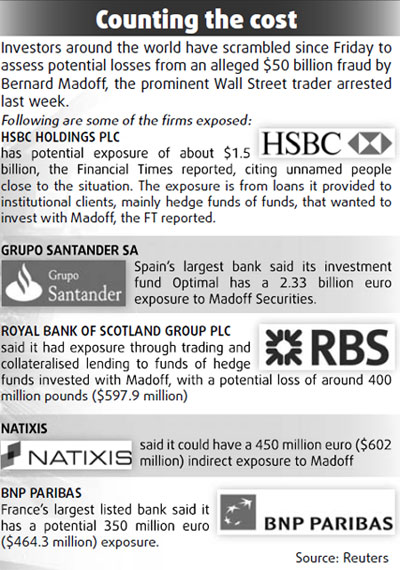
|
WORLD> America
 |
|
How 'one big lie' unravelled in a flash
(China Daily)
Updated: 2008-12-16 08:14 US regulators never inspected Bernard Madoff's investment advisory business, alleged to be a Ponzi scheme that cost investors $50 billion, after he subjected it to oversight two years ago, people familiar with the case said. The Securities and Exchange Commission hadn't examined Madoff's books since he registered the unit with the agency in September 2006, two people said, declining to be identified because the reviews aren't public. The SEC tries to inspect advisors at least every five years and to scrutinize newly registered firms in their first year, former agency officials and securities lawyers said.
Madoff, 70, who had advised the SEC how to regulate markets and donated regularly to politicians, was arrested on Dec 11 and charged with operating what he allegedly told his sons was a long-running Ponzi scheme in the New York-based firm's business advising rich people, hedge funds and institutions. His ability to avoid detection may fuel debate about the SEC's effectiveness and the adequacy of its resources for policing money managers.
"Given what the SEC claims is the magnitude of the fraud, this is something you would hope an inspection would have uncovered," said Mercer Bullard, a University of Mississippi law professor and former mutual-fund attorney at the SEC. "It's hard to imagine a fraud of this alleged size not being accompanied by significant and pervasive compliance problems." Unregistered business Federal officials investigating Madoff have found evidence he ran an unregistered money-management business beside his firm's brokerage and investment-advisory units, said two people familiar with the matter who declined to be identified because the probe isn't public. Authorities are examining why Madoff's wife, Ruth Madoff, is listed on transactions under scrutiny, the people said, emphasizing they haven't determined that she or other people did anything wrong. Madoff is scheduled to appear in federal court in Manhattan on Dec 19 at noon for a hearing in the SEC case, according to his lawyer, Ira "Ike" Sorkin, of Dickstein Shapiro LLP in New York. "This is a tragedy," said Sorkin, a former US prosecutor and SEC enforcement lawyer. "We are going to fight through these events and try to minimize the losses as much as possible." The SEC's Office of Compliance Inspections and Examinations deploys teams from Washington and 11 regional offices to scout for fraud and gauge brokerages and investment managers' adherence to securities laws. Its roster of full-time employees peaked at 880 in fiscal 2006, according to agency budget requests. The regulator expects to have 796 full-time workers in its inspections office for the fiscal year ending next September. 
SEC inspectors examined Madoff's brokerage in 2005, finding three violations of so-called best-execution rules, which require that customer trades be made at the most advantageous prices, agency spokesman John Nester said in a statement. The regulator's enforcement division completed an investigation involving the company last year without bringing a claim, Nester said. SEC inquiry The SEC opened that inquiry after tipsters and press reports said Madoff's purported investment returns may have resulted from front running, in which traders buy shares for their own account before filling customers' orders, a person familiar with the inquiry said. The agency found no evidence that the brokerage did anything improper, the person said. More than a decade earlier, in 1992, Madoff faced regulatory scrutiny as part of a lawsuit the SEC brought against two Florida accountants, whom it accused of raising $441 million while selling unregistered securities over three decades, according to SEC statements and a press report at the time. Madoff's claim Madoff told the Wall Street Journal at the time that he had managed the funds unaware they had been raised illegally. The SEC determined that the investors' money was all accounted for, and didn't accuse him of wrongdoing, according to the report. Sixteen years later, on Dec 11, the SEC and US prosecutors announced in federal court in Manhattan that Madoff had confessed. His advisory business was "all just one big lie," Madoff had allegedly said. The business had been insolvent for years, with losses of more than $50 billion, according to the SEC's account of his statement. Madoff delivered the confession to his sons, Mark and Andrew, who turned him in, according to Martin Flumenbaum, a lawyer representing the brothers. On the morning of Madoff's arrest, more than a dozen SEC inspectors assembled at his office in Manhattan and have since worked overtime to untangle the mess. Though some investigators initially thought the $50 billion total was too high, they now see it as plausible, people familiar with the matter said. The increasing tally is still below that, one person said. |